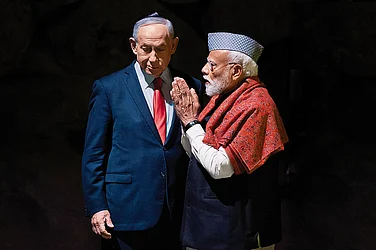It has been six days since Hamas militants stormed Israel, triggering fresh tensions in over a decade-long war against Palestine. The immediate media coverage of the war almost justified the attacks on innocent Palestinian civilians by Israel – it was termed as merely a “retaliation” to the terror attack by Hamas. Many media outlets began the story with the Hamas strike, without referring to the larger historical context of Israel’s oppression of Palestine for decades, as reported by international human rights organisations.
Riyad Mansour, the Palestinian ambassador to the United Nations put this point across in an address he delivered recently: “History begins for some media and politicians when Israelis are killed. Our people have endured one deadly year after another”.
The ongoing war has at least claimed 2,400 lives on both sides. But for some media houses, people in Palestine ‘died’ and people in Israel were ‘killed’. While there might not be a global rulebook on how journalists are supposed to report violence, basic morals and ethics that are taught very early on during the profession do underline the importance of language while spelling out political violence.
For example, the basic rule of tongue while writing a story is to write in the active voice. Using passive voice could create ambiguity in the minds of the reader on who is performing the action. Or in this case, who is inflicting violence. In 2018, a popular media house described an attack by Israeli forces in this way: “Dozens of Palestinians have died in protests as the U.S. prepares to open its Jerusalem Embassy.” A commentator on X, then Twitter, rephrased the description to: "Dozens of Palestinians were shot to death by Israeli soldiers while protesting the US opening of the Jerusalem Embassy."
The use of passive words, along with neutral terms such as ‘operation’ or ‘campaign’ as opposed to an ‘attack’ diminishes the extent of destruction caused to the country that is being targeted.
In July this year, the Israel Defense Forces (IDF) said in a statement that it launched an “extensive counterterrorism effort in the area of the city of Jenin and the Jenin Camp, striking terrorist infrastructure.” Western media houses termed the attack, that killed 10 persons and injured around 100, as an “operation”. These outlets would never describe Israel killing thousands of civilians in Gaza as a “murderous Israeli rampage” or a “bloodthirsty Israeli attack”, The New Arab or Al-Araby Al-Jadeed, a pan-Arab news website had said in one of its reports.
Ongoing war
Ever since Hamas group and Israeli military have launched recent attacks on each other’s territories, several go-to western media houses have reported deaths in this way: “People died in Gaza” whereas “People killed in Israel”. Some reports do not mention the wider political context and the ‘unprovoked attack’ by Hamas becomes the sole point of focus.
Several social media users have pointed out the difference in the language of reporting. “People in Gaza, “have died” People in Israel, “have been killed” Is that real journalism?” – a journalist said in a post on ‘X’. Such framing leaves the reader with just one thought – that people in Gaza died. The cause behind their violent death, which is relevant in the current political context, is not visible in this phrasing.
“This is how media has been programming the entire global population for over 100 years. That is called framing. A dangerous, manipulative propaganda mechanism if it is used for interests and agenda,” another user said on ‘X’.
Such ‘framing’ is also visible during interviews that media channels have conducted in the last few days. On Sunday, a journalist spoke to Palestinian Ambassador to the UK Husam Zomlot immediately after she interviewed an Israeli Likud (right-wing political party) politician. The very first question the journalist asked was if the Ambassador would condemn Hamas' actions. The envoy refused to answer the question, explaining: “The business of always being obsessed with blaming the victim, the occupied, the colonised, the besieged, when in fact I didn’t see you asking her [the Likud politician] to condemn … with your first question: the killing of an entire family [in Gaza] that your reporter just mentioned.” Many such media channels that have interviewed voices from Palestine, have posed this as the first question to them.
It was almost like a script. In another interview on a popular western media channel, the Palestinian Ambassador regretted the loss of every life. “The question is how do we stop this? And how do we stop the Israeli massacres against the Palestinians?” he asked. The anchors interrupted him, and asked him if this means he supports what Hamas did. Reiterating support for human rights of those in Gaza, who have already been under an Israeli siege for 16 years, is not synonymous with endorsing what Hamas did.
The Palestinians, he said, are always expected to condemn themselves. “You’ve interviewed hundreds of Israeli officials. How many times did you start [the interview] by asking them to condemn themselves after committing war crimes? You don’t. I refuse to answer your question because I refuse its premise,” he retorted.
This phenomenon, though, is not new. Almost 70 years ago, in his essay “Politics and the English Language,” George Orwell observed how governments manipulate public opinion by describing violent, inhumane policies in imprecise, euphemistic terms. “Defenseless villages are bombarded from the air, the inhabitants driven out into the countryside, the cattle machine-gunned, the huts set on fire with incendiary bullets: this is called pacification. Such phraseology is needed if one wants to name things without calling up mental pictures of them,” wrote Orwell.
On the other hand, Indian media has been devoting elaborate time and space for the ongoing war on its platforms. Some political leaders questioned the immediate response and coverage to Israel when the same platforms diverted their screen time from the ongoing violence in Manipur which erupted in May this year. In fact, the Manipur government has now prohibited the circulation of videos or images depicting violence and damage to properties to restore normalcy in the ethnic strife-torn state.
The ongoing war is also a war of words. Writer and English professor Moustafa Bayoumi, of City University of New York, wrote in The Guardian: It is the peculiar fate of oppressed people everywhere that when they are killed, they are killed twice: first by bullet or bomb, and next by the language used to describe their deaths.






















